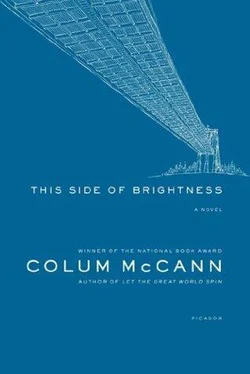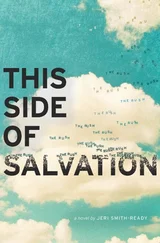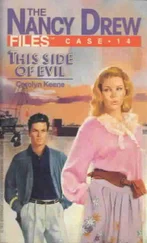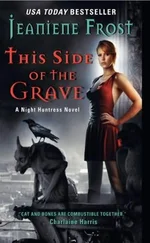In the middle of the solid column of type — alongside an artist’s interpretation of the burst — it says that Con O’Leary, 34, from Roscommon, Ireland, is still missing, presumed dead.
Neighbors arrive at Maura’s fourth-floor tenement flat. They spread themselves out in a nimbus in her living room, silent in black dresses. Flowers sent by Walker, Vannucci, and Power stand on a small table.
A daguerreotype of O’Leary is being prepared for a mass card. Maura uses a kitchen knife to cut herself out of the old wedding photograph. When O’Leary is left alone, he stares up at her from the palm of her hand. She raises the image and touches it with her lips. In the photo her husband has a hard, taciturn face. The digger lived much of his life in a taciturn way, coming home, scraping mud from his boots with a knife, the slow silences at dinnertime when she would ask him to do a chore, the shrug of his shoulders, the lovely way he’d raise his chubby palms in the air and ask her, “But why?” An old white shirt of his is still hanging out the window to dry. Maura had been scrubbing the ring of dirt from around the collar. A catechism is open on the table, and Con’s baseball cards are scattered beside the book: to become an American, O’Leary had decided to fall in love with the game, following it meticulously. He knew every score, each stadium, all the managers, hitters, pitchers, catchers, and basemen.
The gutted piano he was fixing stands in front of the fireplace, the black and white keys spread out on the floor. He had rescued it from a rubbish dump and dragged it through Manhattan with a rope, destroying the carved legs as he pulled it over cobblestones. Four men were employed to help carry it up the stairs, only for O’Leary to discover it was an imitation Steinway, worth little more than the wood it was made with. He had been filing the keys down; they’d been sticking against each other, causing notes to distort. At night they would summon up songs that she could play.
Maura places the daguerreotype on top of the piano and turns her head as someone knocks on the door.
A heavy man, in a suit and tie and derby hat, brushes snow off his shoulders as he enters. He asks the neighbors if they will leave.
The women wait for Maura to nod and then file out, casting suspicious backward glances. They remain on the stairs, straining to hear. Wide-bottomed, the man sits in the only chair. He hitches up his trousers and Maura can see — as a puddle forms around his feet — his polished shoes.
“William Randall,” he says.
“I know who you are.”
“I’m deeply sorry.”
“Would you like a cup of tea?” She speaks as if there were marbles in her throat.
“No, ma’am.”
“The kettle’s on.”
“No, ma’am, thank you.”
And then a long silence as he remembers to take off his hat.
“After the blowout,” Randall says, “the tunnel was flooded. The other men were lucky to survive. We had to lay a canvas sheet on the river bottom. We dropped clay on top of it. From a barge. To seal the tunnel up again. We had to do it. We will, of course, give you compensation. Ma’am? Enough for you and the child.”
He points toward the bulge, and Maura folds her hands across it.
“There was no time to look for Con’s body,” he says. “We believe he got stuck in a second blowout. That’s all we can say. Will a hundred dollars suffice?”
Randall coughs and makes curlicues at the ends of his tawny mustache.
“The body might emerge; then we can pay for the funeral too. We’ll pay for the funeral anyway. Are you going to have a funeral? Ma’am? Mrs. O’Leary? I believe in looking after my workers.”
“You do?”
“Always looked after my workers.”
“You can leave now, please.”
“There’s always hope.”
“I appreciate your faith, but you can leave.”
His Adam’s apple bobs up and down. Randall mops his brow with a handkerchief. Beads of sweat reappear immediately.
“I said you can leave.”
“Ma’am?”
“Leave.”
“If that’s how you want it, ma’am.”
Maura O’Leary watches Con’s shirtsleeves flapping in the window, greeting the snow. She runs her finger around the rim of an empty teacup, curses herself for offering Randall some tea. She says nothing more, just goes to the front door and gently pulls it open for him. She stands behind the frame. The neighbors step back and let the man pass, watching him as he lumbers down the stairs, a roll of fat wobbling at the back of his neck. The women file back into Maura’s room, half a dozen accents merging into one. The sound of a car outside drowns out the muffled clip-clop of a horse’s hooves. Children are playing baseball with hurley sticks. At the window, Maura watches the children step out of the path of Randall’s motorcar, some of the boys reaching out to touch its waxed body. Maura pulls across the lace curtain and turns away.
The neighbors clasp their hands and hang their heads, too polite to ask what happened. Maura stands with them — nobody wants the chair — and combs a long strand of hair away from her eye. She tells her neighbors that her husband has already become a fossil and some of them wonder what the word means, but they nod their heads anyway and let it hang on the edge of their lips: fossil.
* * *
Nathan Walker repeats the word after making a brief visit to Maura’s apartment, having left an envelope full of money on the kitchen table after passing the hat among the sandhogs.
He walks the bright winter streets toward the ferry and wipes at his eyes with an overcoat sleeve, recalling one evening last winter after work. He was coming out early from the hog-house showers and was set upon by four drunken welders. They used the handles of pickaxes as weapons. The blows rained down on the top of his skull, and he fell. One of the welders leaned over and whispered the word “nigger” in his ear, as if he had just invented it. “Hey, nigger.” Walker looked up and smashed the man’s teeth with the heel of an open palm. The pickax handles hit him again, the wood slipping on his bloody face. And then came a shout—“Jaysus Christ!”—and he recognized the voice. Con O’Leary, out from the shower, stood only in his boots and trousers. The Irishman looked flabby and gigantic in the sunlight. He began swinging with his fists. Two of the welders fell, and then police whistles were heard in the distance. The welders stumbled off, scattering in the dark streets. O’Leary knelt down on the ground and held Walker’s head against his white chest. “You’ll be all right, son,” he said.
A patch of blood spread beneath the Irishman’s nipple. He picked up Walker’s hat from the ground. It was full of blood.
“Looks to me like a bowl of tomato soup,” said O’Leary.
The two men tried to laugh. O’Leary had said the word “tomato” as if there were a sigh in the middle of it. For weeks afterward Walker would see his friend and remember every syllable: to-mah-to.
Now, moving down the streets of the Lower East Side, Walker wipes the tears from his eyes and hefts the weight of another word upon his tongue: fossil.
chapter 3. the first snow
There is a moment upon waking when he thinks he might not wake forever. Treefrog touches his liver to make sure he is still alive and remembers the crane found frozen yesterday in the Hudson.
A jab of pain rocks his stomach. He turns in his sleeping bag, pulls the zipper down, opens his shirt, and rubs his fingers over the dent the metal has made in his chest. He pinches the dent on either side and watches a red welt rise on his skin. Cold, so goddamn cold, colder than topside even. Reaching across his bedside table, he lights a Sabbath candle and holds both hands over the flame, letting the heat slip through him. His palms hover close to the flame and for a moment his hands seem disembodied in the candlelight, the rest of him left in darkness. The closer his palms get to the candle, the higher the flame licks. Treefrog allows his hands to hover until the heat is so intense he pulls away, enjoying the pain, his two hands held high in the frigid air.
Читать дальше












